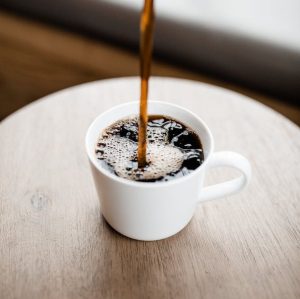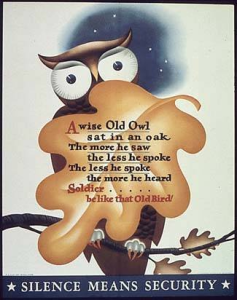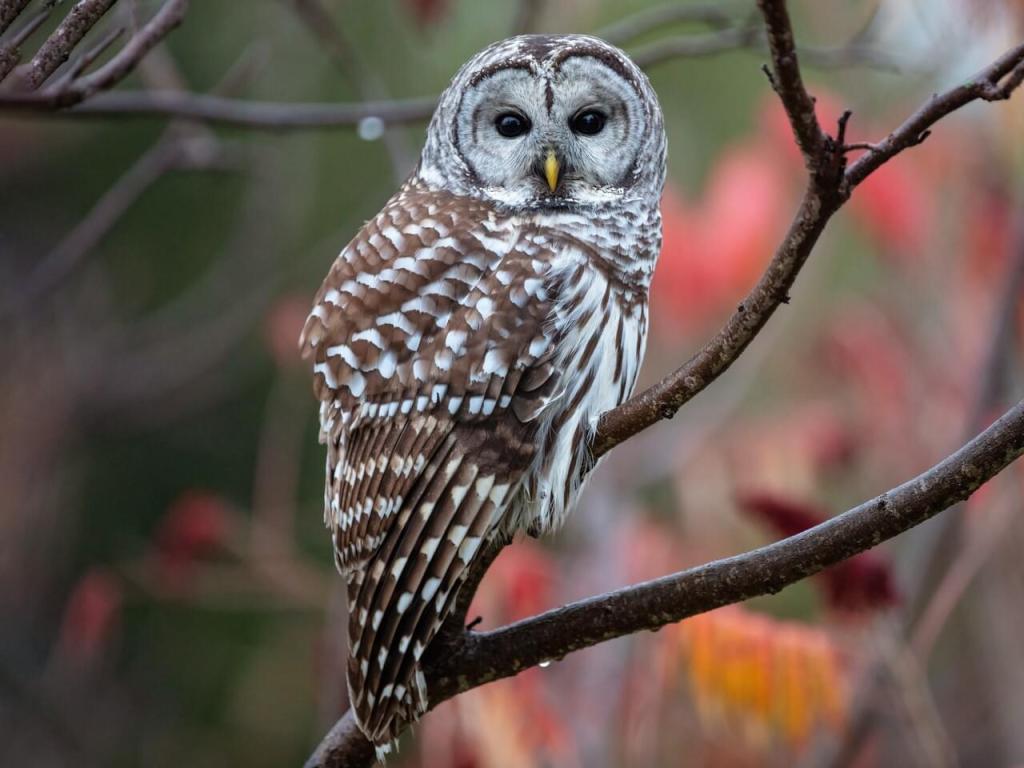The path was purple in the dusk. I saw an owl, perched, on a branch. Excerpt from “The Owl” by Arthur Sze
The owl, with its nocturnal lifestyle, distinct appearance, and its connection to legends and folklore, has made it the perfect subject for poets and poetry. Today we are reading owl-inspired poetry by Kobayashi Issa, Alan Watts, Emily Dickinson, and more.
Owls in Haiku
In the 1800s, the Japanese poet Issa wrote several owl haiku. Below are a few examples.
the owl is happy in his solitude... autumn dusk -Issa
in the owl's opinion every day is long -Issa
In 1973, Alan Watts wrote this haiku about an owl.
Owl at night is always sound, not sight -Alan Watts
Athena’s owl also found her way into this 1965 haiku by Marjory Bates Pratt.
Athene’s small owl is there, perched on a column in ruined Ephesus. -Marjory Bates Pratt
In Ancient Greece, Athena, the goddess of wisdom, was often depicted with an owl. Athena’s owl symbolized great knowledge and allowed her to see the truth.(2)
Owls in Long Form Poetry
The legend of the wise old owl, which began back in Ancient Greece, was brought forward into modern culture with this childhood rhyme.
A wise old owl lived in an oak The more he saw the less he spoke The less he spoke the more he heard. Why can't we all be like that wise old bird?
This nursery rhyme was first published in 1875. At that time its last line was, “O, if men were all like that wise bird”(4). Over the years, the rhyme has gone through many revisions including the one below that was used during World War II.
In 1863, Emily Dickinson wrote her owl poem.
“The Judge is like the Owl” – by Emily Dickinson
The Judge is like the Owl – I’ve heard my Father tell – And Owls do build in Oaks – So here’s a Amber Sill – That slanted in my Path – When going to the Barn – And if it serve You for a House – Itself is not in vain – About the price – ’tis small – I only ask a Tune At Midnight – Let the Owl select His favorite Refrain –
Contemporary poet Susan Wood gives us this wonderful pairing of poetry and art called the “Dance of the Barn Owl”.
The evening draws nigh and the stage is set, An inspired portrayal awaits us yet. The jet-black eyes search the ground, While invisible ears, listen for sound. Balletic moves and contours to see, Floating feathers, airless and free. Cavorting glides and swaying moves, As night slowly ebbs, the dance improves. Ghostly white owls float on the breeze, Performing an encore draped by the trees. We perceive the ballet for a fleeting time, An accomplished performance: a vision sublime.
Both Dickinson’s and Wood’s poems highlight the behaviors of the owl. The gentle flight, the stoic perching, and the distinct call are all characteristics that make this bird so special.
To close out this exploration into owl poetry, I want to return to Issa. The following haiku was written in 1816.
you too owl dedicate a haiku... this winter rain -Issa
David G. Lanoue says that with this haiku, “Issa alludes to the death anniversary of the great poet, Bashô: Tenth Month, 12th day. On this day, every poet worth his salt composes a verse in Bashô’s honor–including, Issa jokes, an owl.” (5)
Resources
- Learn Religions.com Mictlantecuhtli: God of Death in Aztec Religion
- GowiseOwl.com:What Does the Owl of Athena Represent?
- Owlcation: The Symbolism of Owls in Japan
- Wikipedia: Wise Old Owl
- David G. Lanoue: Issa Haikus
The haiku from Alan Watts and Marjory Bates Pratt were sourced from “Owls: A Field Guide To North American Haiku” by Charles Trumbull first published in Frogpond volume 42.2
Issa’s haiku were found on Haikuguy.com. This website holds a comprehensive list of Issa haiku translated and curated by David G. Lanoue.
Emily Dickinson’s “The Judge is Like an Owl” was found on Dickinson’s Birds
Susan Wood’s “Dance of the Barn Owl” can be found in her book Òran Uisge – Wildflower Meadow or by visiting her website. You can also read our interview with Susan Wood here.
“The Owl” by Arthur Sze can be found in his book The Glass Constellation: New and Collected Poems or at The Poetry Foundation
Want to support our work? Visit the Naturalist Weekly bookstore and browse our curated lists of books of poetry and haiku. Or pick up a gift card that can be used throughout the store.




Mark, really the enjoyed the owl theme today. It reminded me of my recent encounter with the eastern screech owl. I indeed found out that “the owl at night is always sound, not sight.”
Hi Adele, thanks for the comment! It sounds like the owl encounter was interesting. Did you just hear it during the night, or were you able to see it? I pretty much only hear the owls.
I only heard it, but I think we saw it flying away when we opened the back door.
I didn’t realize the Mayans’ symbolism about owls — it’s interesting how cultures form a variety of meanings on something. And what lovely poetry in your post. The haiku are fantastic, and the children’s rhyme has wisdom that everyone, no matter what age, could use. To see and listen, to open yourself to what others and nature have to say.
Hi Dave, I agree with your comment on the nursery rhyme. After I read it, I felt like I had heard it somewhere before. Although, I am not sure. Thanks for the comment. Have a good weekend.
I love owls, they are Majestic creatures. Thank you for this, it was very informative and I always like learning about things like this.
Hi Angellily, I am glad that you enjoyed this post. I always try to blend the facts with the poetry, I feel like it can add so much to the context for the poems. Thanks for the comment!
It was very good, I learned alot about owls that I didn’t know already. You are welcome
A wonderful post about these special birds (raptors). Thanks, Mark!
Hi Ashley, such a good reminder to call owls raptors. Hope you are well! Talk soon
Great post! I loved how you brought Dickinson into this, one of my favorite poets. She was remarkably learned in naturalism and brought great insight into her poems. Also I’d like to recommend this video which shows how unique Barn Owls are 🙂
Thanks for the video recommendation! I’ll go take a look at it!
Great theme, Mark. Owls are wonderful birds! We often hear them calling during the night here.
A special memory I have is of one evening, while out with the dogs, an owl glided towards me. At first it looked like it was heading right for me, but it effortlessly sailed over and above me. I hadn’t seen it until it was quite close. What an overwhelming feeling to experience what I felt to be a rare sight.
Some time after that, I read a book called ‘I Heard The Owl Call My Name’ by Margaret Craven. It’s about a young Anglican priest who hasn’t long to live and who’s sent to the Indian village of Kingcome in the wilds of British Columbia. It had a great impact on me all those years ago. You’ve reminded me of it and I want to read it again.
Owls are also special to me because they were my older brother’s favourite bird. 🙂
What a wonderful encounter. How amazing that must have been to have the owl fly that close!
That book sound really interesting. I may have to see if I can find it.
Thanks for sharing! Have a good start to you week.
It was, Mark, and totally unexpected. You have a great week too! 🙂
p.s. One of my favourite birds is The Liver Bird. 😍
http://www.poetryatlas.com/poetry/poem/2611/the-silence-of-the-liver-bird.html
There is research to be done here! I couldn’t figure this out at first, especially with the Beatles reference in the poem. But I got it! Thanks for sharing this.
I’m glad you got it, Mark. 😀 I fell in love with Liverpool from my very first visit – not because of the Beatles association – but for the city itself. It’s a vibrant place with a lot of fascinating history. Since then, I’ve had a thing for the Liver (pronounced ‘lie-ver’ bird). For centuries, people have been guessing which bird it’s based on. The most likely one is the Cormorant.
In my hometown, the cry of an owl near a house signified a looming death, especially when it’s repeated many times in a day for days. And when it cries from a large tree in a community, it’s believed to be a sign of a bad omen. But this belief is always a myth to me. An owl is a cute animal and shouldn’t be associated with something evil.
Hi Florence, Thank you so much for sharing this. I knew that the owl was connected to other myths about being a signal of death or bad omens. The owl seems to be a little like the moth in that way, it can either be a positive or negative sign depending on the culture. Thanks again for sharing this.
You’re most welcome, Mark.
What a wonderful post, Mark. Whooo knew there were so many poems dedicated to wonderful owls? I especially loved Issa’s haiku:
in the owl’s opinion
every day
is long
Hi Tracy, I know! What a great haiku. I am really enjoying Issa’s approach to writing.
It’s really wonderful and amazing you made it unique and put alot.of effort in discovering the mysteries of owls with these wonderful poems. Really well 👍
Thank you so much! I am glad that you enjoyed the post. And thanks for the continued support.
Hi bit late reading this one – I just love the sound of an owl late at night – somehow comforting
PS What about Edward Lear’s poem The Owl and the Pussy-cat ! 🙂 First stanza below:-
The Owl and the Pussy-cat went to sea
In a beautiful pea-green boat,
They took some honey, and plenty of money,
Wrapped up in a five-pound note.
The Owl looked up to the stars above,
And sang to a small guitar,
“O lovely Pussy! O Pussy, my love,
What a beautiful Pussy you are,
You are,
You are!
What a beautiful Pussy you are!”
This is great! I am not familar with this one and this addition is very much appreciated! Thank you for adding to the discussion.